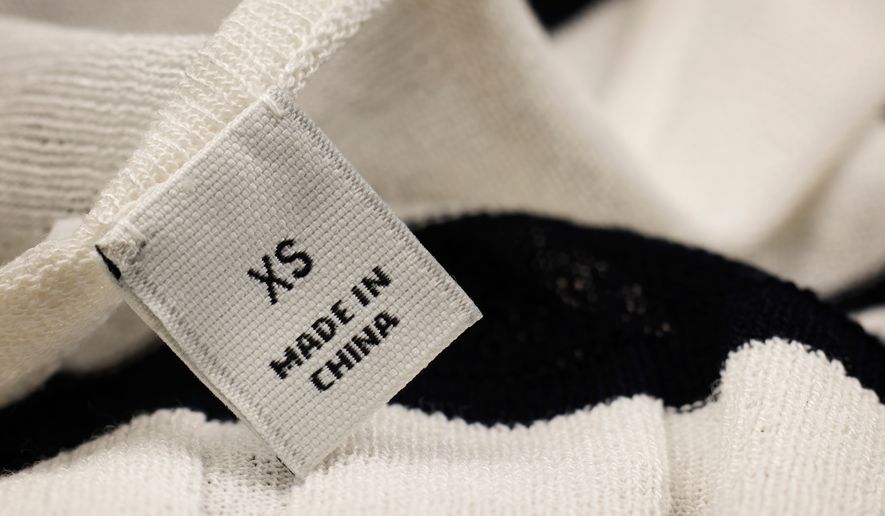Two free-market economists Thursday night used the United States’ supply chain woes to argue for labeling Chinese goods made with forced labor.
George Mason University economists Christine McDaniel and Weifeng Zhong, appearing at the nonprofit Institute on Religion and Democracy in downtown Washington, said the U.S. is paying the price for becoming too reliant on cheap Chinese imports and looking the other way at the communist country’s forced labor practices for the past 20 years.
“Demand better labeling. Not just to know that something was made in China, but to verify that it was not made by forced labor,” Ms. McDaniel, a trade relations specialist, told The Washington Times after the event.
Ms. McDaniel said accurate labeling would make it possible for Americans to avoid Chinese products not certified as coming from fair labor practices, even though it would burden China’s manufacturers financially to do more rigorous checks.
“I think there are a lot of Americans who want to help, but they feel overwhelmed because they don’t have the information or time,” she said. “So the best we can do is to have more information for the consumer, which puts the burden on manufacturers.”
The George Mason professors, senior fellows at the school’s libertarian Mercatus Center think tank, said in their talk that the U.S. would not be in such a difficult situation with the global supply chain shortage had it not become so dependent on Chinese low-cost labor for labor-intensive goods that were once made in America.
Mr. Zhong, who grew up in China and graduated from college there in 2006, said it was ironic that many of his countrymen had initially opposed the country’s December 2001 entry into the World Trade Organization as an effort to reform the communist nation’s labor practices.
Instead, he said the Communist Party had found ways to keep “anywhere from hundreds of thousands to perhaps a few million” of its citizens, largely political dissidents, in forced labor even as part of the global free market.
“We have goods made from China, possibly with forced labor, and really there’s no good way to verify,” Mr. Zhong said.
He said the Chinese regime quietly herds many of its forced laborers back and forth from home, rather than keeping them in camps, and rubber stamps the labor practices to say that “to the best of their knowledge” there is no forced labor.
Because of that, Mr. Zhong said it’s up to Americans and other outsiders to push back against the tide of cheap Chinese goods that flood the market.
Their comments came during a week in which U.S. legislators and Chinese communist officials have dueled over forced labor claims in a series of articles from Reuters.
At a Friday press conference, the Xinjiang Uyghur Autonomous Region in northwest China denied the reports that it was trafficking Uyghur Muslims into forced labor.
Xu Guixiang, spokesperson for Xinjiang’s regional government, further accused the U.S. of having a long history of forced labor even though it plays the international role of “human rights defender,” Reuters reported.
“The U.S. claims of ’large-scale forced labor’ in Xinjiang are a complete distortion of the reality of people in Xinjiang and groundless lies made up by some organizations in the West along with anti-China individuals,” Mr. Xu said.
The press conference came after three senators on Wednesday hit Arizona-based Universal Electronics Inc. for employing 365 Uyghur workers in Xinjiang and at its plant in the southern Chinese province of Guangxi as part of a worker-transfer agreement that the company said ended last week.
Sens. Marco Rubio, Florida Republican, Robert Menendez, New Jersey Democrat, and Jeff Merkley, Oregon Democrat, demanded answers in a joint letter to the company following an earlier Reuters report on the company’s Chinese interests.
“American companies must scrupulously avoid forced Uyghur labor in their Chinese operations, including by carefully vetting arrangements with third-party labor agents. Last week’s reports indicate Universal Electronics may be failing in this duty,” the senators wrote in the letter posted on Mr. Rubio’s website.
Citing the State Department’s 2021 Trafficking in Persons Report, the senators’ letter accuses the Chinese Communist Party of “threats of physical violence, forcible drug intake, physical and sexual abuse, and torture to force detainees to work in adjacent or off-site factories or worksites.”
Ms. McDaniel said at Thursday night’s panel discussion that just because a product says “made in China” doesn’t mean it wasn’t made with forced labor — and Chinese officials are happy not to look too closely at the issue.
“The Chinese Community Party does not want audits,” she said.
• Sean Salai can be reached at ssalai@washingtontimes.com.




Please read our comment policy before commenting.